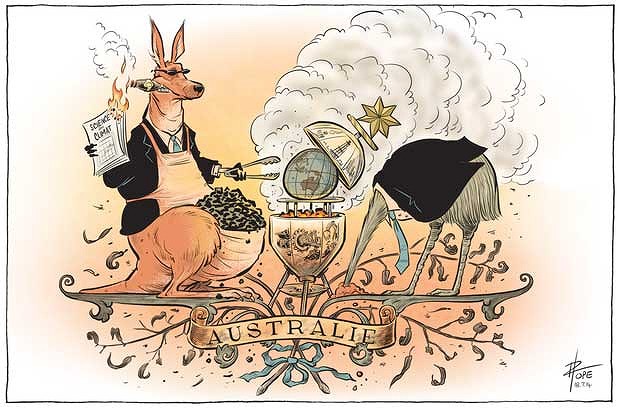Search
Democracy Links
Member's Off-site Blogs
from the land of philistines & false prophets ....

The reality is that much of Australia’s corporate landscape is owned by faceless people hiding behind big nominee companies that are virtually impossible to research. The same is for global investment banks, insurance companies and the Commonwealth public servant superannuation scheme. Many companies have directors who are involved in media, banking, and politics, with many ex-politicians coming onto boards when they leave Parliament.
There is ample evidence of the close relationships between business and politicians of the two main parties: Labor and Coalition. ‘Labor’ has been able to stay longer than usual in government only by accommodating to business interests, particularly when the Prime Minister was Hawke. He was able to establish a special connection with a significant group within the dominant corporations of Australia. Still, Big Business may have a stronger influence at state level, where government can directly facilitate access to prime land and assets that each state controls.
Today in Australia Big Business is able to practice a special function against small competition by dictating terms unfairly to smaller businesses. This is particularly evident in the retail area, where supermarkets have acted for quite some time as a substantial duopoly through which they control over 90 per cent of retail sales, and the relevant profit margins which have gone from 20 per cent in the 1970s to over 50 per cent nowadays.
With so much ownership concentration of Australian business and industry through skilful funds control, the devices still possible under corporation law, the presence of interlocking directorates, a very few people can exercise great influence over the Australian economy.
Many company boards and directors can operate with little, and some with no, accountability.
The potential for easy manipulation of share prices is still there on a huge scale. HSBC Nominees, JP Morgan, and Citicorp Nominees are the first, second and fourth largest shareholders in the Australian Stock Exchange.
The institutions, both private and public, of Australian trade continue to support the myth of Australia as a competitive economy. The contrary is true: most of Australia’s largest corporations operate either as monopolies or exercise some form of oligopoly.
Here are some examples:
BHP Billiton, Rio Tinto, Woodside Petroleum, Newcrest Mining, Fortescue Metals and Origin Energy all have monopoly control over the resources they exploit;
The four major banks exercise almost 90 per cent control over all transactions in the economy and the smaller banks have the same shareholding as the ’Big 4’ as well,
News Corporation controls some 80 per cent of all metropolitan newspapers in Australia,
Wesfarmers is a conglomerate which operates Coles (Supermarkets), Bunnings (Retail/Trade hardware), Target (Retail), Kmart (Retail), Officeworks (Office and stationery products) in duopoly markets,
Telstra (Telephones) has a near monopoly,
Woolworths (Supermarkets) operates in a duopoly with Coles.
Westfield Group (Shopping centres) operates a unique group of shopping centres without competition, and
CSL (Biotechnology) has an almost complete monopoly on all blood products.
The top businesses in Australia do not exist within competitive environments and are able to earn above average profits. This has potential consequences for local innovation, consequences for sustainable exploitation of resources, consequences for which industries survive and which industries are lost, and consequences for the cost of living for Australians, not to mention fairness and transparency in the marketplace.
According to figures collected in 2012 by IBIS World (Market research reports), New South Wales is home to 41 per cent of the top 500 enterprises in Australia by revenue. This figure includes many foreign own companies which use New South Wales as a base for expanding Asia Pacific operations. New South Wales is historically run by the most corrupt government - ‘Labor’ or ‘Liberal’.
Multinational corporations with a major presence in New South Wales include: Coca-Cola Amatil, Nestlé, Google, GE, IBM, BAE Systems (Defence and security), Thales (Aerospace, defence, security and transportation), Aldi (Supermarkets), DHL (International express deliveries), DB Schenker (Integrated logistics services), DP World (Marine terminal operator), BHP Billiton, Rio Tinto, Xstrata, Caltex, Suntech (Solar panels) , Epuron (Renewable energy), EnergyAustralia, SAP (Software) and Virgin Money (Credit cards, insurance, superannuation) …..
Australia - From Le socialisme sans doctrines To A Corporatised Client State
- By John Richardson at 19 Jul 2014 - 11:50am
- John Richardson's blog
- Login or register to post comments
Recent comments
4 hours 1 min ago
5 hours 26 min ago
5 hours 32 min ago
8 hours 3 min ago
1 day 1 hour ago
1 day 1 hour ago
1 day 2 hours ago
1 day 2 hours ago
1 day 3 hours ago
1 day 5 hours ago